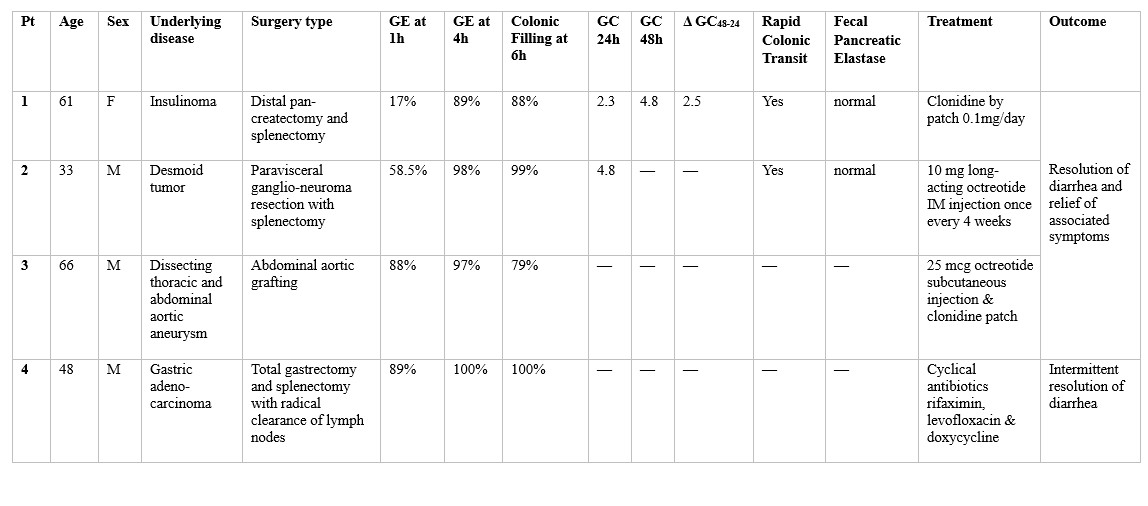Sunday Poster Session
Category: Stomach and Spleen
P2085 - Gastrointestinal Symptoms as a Result of Sympathetic Denervation During Retroperitoneal Surgery
Sunday, October 26, 2025
3:30 PM - 7:00 PM PDT
Location: Exhibit Hall

Ayah Matar, MD
Mayo Clinic
Rochester, MN
Presenting Author(s)
Ayah Matar, MD, Thomas Stievenard, , Kara J. Jencks, MD, Michael Camilleri, MD, DSc
Mayo Clinic, Rochester, MN
Introduction: The extrinsic sympathetic and parasympathetic nerves influence function of the enteric nervous system. Sympathetic innervation of the abdominal organs synapses in the prevertebral ganglia and functions as the “brake” of bowel motility. Previous studies in dogs documented celiac (Annu Rev Physiol 1981;43:53-68) or mesenteric ganglionectomy (Am J Physiol 1979;237:E432–43) are associated with persistent diarrhea. Sympathetic adrenergic denervation (e.g. in diabetic animals) also results in small intestinal secretion (J Clin Invest 1985;75:1666-70). We aimed to describe patients presenting with abdominal pain, diarrhea, and nausea following surgical disruption to prevertebral ganglia, and to document the prescribed treatments and outcomes based upon clinical follow-up.
Case Description/
Methods: We included 4 patients who developed diarrhea after undergoing surgery in the region of the prevertebral ganglia and diagnostic testing (including scintigraphic measurement of gut transit, as well as fecal pancreatic elastase). The demographics, clinical features, indication for surgical procedure, results of tests and treatments administered in the 4 patients are shown in table. All underwent gastric and small bowel transit (measured using 99mTc-egg meal [320kcal, 30% fat]), and, in 2, colonic transit was measured using 111In-charcoal particles delivered to the colon. All patients developed diarrhea and abdominal pain after surgery, 3 experienced nausea, 2 had rapid colonic transit (shown by the geometric center [GC] at 24h and the difference between GC at 24h and 48h), and 3 had fast gastric emptying at 1h. The first patient did not respond to rifaximin (for presumed small intestinal bacterial overgrowth) and pancreatic enzyme supplementation. The second patient also lacked improvement on a combination of loperamide, darifenacin, and a bile acid sequestrant. After starting these first 3 patients on α2-adrenergic agonist clonidine (patch) or somatostatin analog, octreotide, they reported resolution of diarrhea and relief of associated symptoms upon follow-up. Patient 4 was treated with cyclical antibiotics with short-term improvement.
Discussion: The clinical features and rapid gastrointestinal and colonic transit following retroperitoneal surgery conceivably damaged sympathetic innervation to the gut. The positive response to treatment with clonidine and octreotide suggests also a component of secretory diarrhea in these patients.

Figure: Table. Demographics, indication for the surgical procedure, type of surgery, results of tests, treatments administered, and outcome of the identified patients. GE=gastric emptying, Δ=Delta (GC48 – GC24)
Disclosures:
Ayah Matar indicated no relevant financial relationships.
Thomas Stievenard indicated no relevant financial relationships.
Kara Jencks indicated no relevant financial relationships.
Michael Camilleri: Alfasigma – Consultant. Amylyx – Consultant. Biocodex – Grant/Research Support. BioKier – Consultant. Brightseed Bio – Consultant, Grant/Research Support. Coloplast – Consultant. Dignify Therapeutics – Stock Options. Intercept – Consultant. Invea – Consultant. Kallyope – Consultant. McDermott Will & Emery – Consultant. Medpace – Consultant. Monteresearch – Consultant. Neurogastrx – Consultant. NGM Biopharmaceuticals – Grant/Research Support. Pfizer – Grant/Research Support. Phenomix – Stock Options. Renexxion – Consultant. SKYE Bioscience – Consultant. Sumitomo – Consultant. Synlogic – Consultant. Vanda – Grant/Research Support.
Ayah Matar, MD, Thomas Stievenard, , Kara J. Jencks, MD, Michael Camilleri, MD, DSc. P2085 - Gastrointestinal Symptoms as a Result of Sympathetic Denervation During Retroperitoneal Surgery, ACG 2025 Annual Scientific Meeting Abstracts. Phoenix, AZ: American College of Gastroenterology.
Mayo Clinic, Rochester, MN
Introduction: The extrinsic sympathetic and parasympathetic nerves influence function of the enteric nervous system. Sympathetic innervation of the abdominal organs synapses in the prevertebral ganglia and functions as the “brake” of bowel motility. Previous studies in dogs documented celiac (Annu Rev Physiol 1981;43:53-68) or mesenteric ganglionectomy (Am J Physiol 1979;237:E432–43) are associated with persistent diarrhea. Sympathetic adrenergic denervation (e.g. in diabetic animals) also results in small intestinal secretion (J Clin Invest 1985;75:1666-70). We aimed to describe patients presenting with abdominal pain, diarrhea, and nausea following surgical disruption to prevertebral ganglia, and to document the prescribed treatments and outcomes based upon clinical follow-up.
Case Description/
Methods: We included 4 patients who developed diarrhea after undergoing surgery in the region of the prevertebral ganglia and diagnostic testing (including scintigraphic measurement of gut transit, as well as fecal pancreatic elastase). The demographics, clinical features, indication for surgical procedure, results of tests and treatments administered in the 4 patients are shown in table. All underwent gastric and small bowel transit (measured using 99mTc-egg meal [320kcal, 30% fat]), and, in 2, colonic transit was measured using 111In-charcoal particles delivered to the colon. All patients developed diarrhea and abdominal pain after surgery, 3 experienced nausea, 2 had rapid colonic transit (shown by the geometric center [GC] at 24h and the difference between GC at 24h and 48h), and 3 had fast gastric emptying at 1h. The first patient did not respond to rifaximin (for presumed small intestinal bacterial overgrowth) and pancreatic enzyme supplementation. The second patient also lacked improvement on a combination of loperamide, darifenacin, and a bile acid sequestrant. After starting these first 3 patients on α2-adrenergic agonist clonidine (patch) or somatostatin analog, octreotide, they reported resolution of diarrhea and relief of associated symptoms upon follow-up. Patient 4 was treated with cyclical antibiotics with short-term improvement.
Discussion: The clinical features and rapid gastrointestinal and colonic transit following retroperitoneal surgery conceivably damaged sympathetic innervation to the gut. The positive response to treatment with clonidine and octreotide suggests also a component of secretory diarrhea in these patients.

Figure: Table. Demographics, indication for the surgical procedure, type of surgery, results of tests, treatments administered, and outcome of the identified patients. GE=gastric emptying, Δ=Delta (GC48 – GC24)
Disclosures:
Ayah Matar indicated no relevant financial relationships.
Thomas Stievenard indicated no relevant financial relationships.
Kara Jencks indicated no relevant financial relationships.
Michael Camilleri: Alfasigma – Consultant. Amylyx – Consultant. Biocodex – Grant/Research Support. BioKier – Consultant. Brightseed Bio – Consultant, Grant/Research Support. Coloplast – Consultant. Dignify Therapeutics – Stock Options. Intercept – Consultant. Invea – Consultant. Kallyope – Consultant. McDermott Will & Emery – Consultant. Medpace – Consultant. Monteresearch – Consultant. Neurogastrx – Consultant. NGM Biopharmaceuticals – Grant/Research Support. Pfizer – Grant/Research Support. Phenomix – Stock Options. Renexxion – Consultant. SKYE Bioscience – Consultant. Sumitomo – Consultant. Synlogic – Consultant. Vanda – Grant/Research Support.
Ayah Matar, MD, Thomas Stievenard, , Kara J. Jencks, MD, Michael Camilleri, MD, DSc. P2085 - Gastrointestinal Symptoms as a Result of Sympathetic Denervation During Retroperitoneal Surgery, ACG 2025 Annual Scientific Meeting Abstracts. Phoenix, AZ: American College of Gastroenterology.

